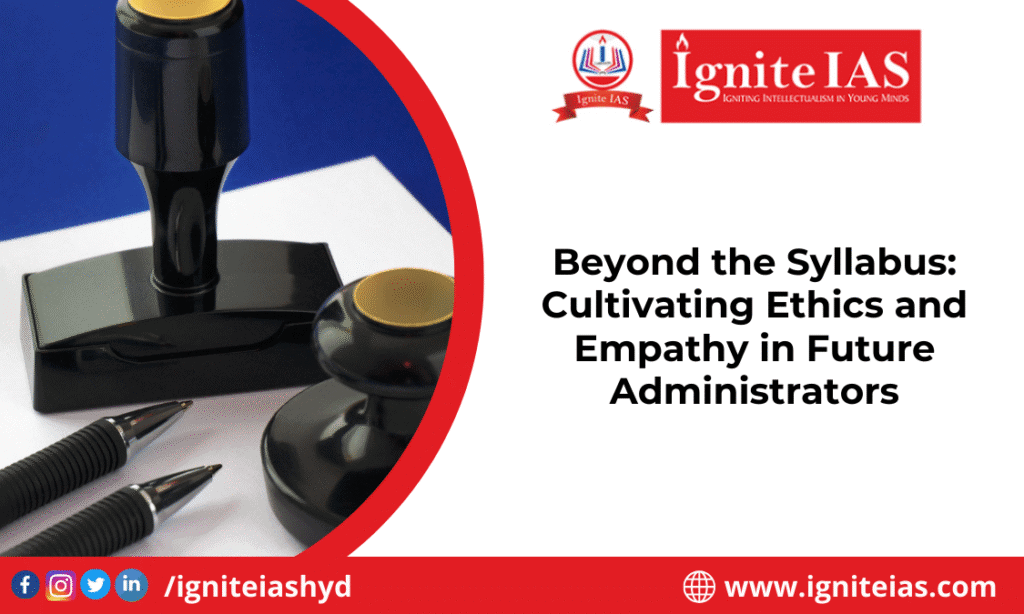Introduction
The real test of an administrator isn’t how well they remember the Constitution—it’s how well they stand by it during a crisis. In an era where governance demands more than intelligence, ethics and empathy have become indispensable traits for civil servants.
At Ignite IAS, we believe UPSC preparation is not only about mastering GS papers or writing perfect essays—it’s about becoming the kind of person India can trust with responsibility. That’s why our focus goes far beyond the syllabus. We nurture emotionally intelligent, ethically grounded, and socially aware future administrators.
Let’s explore how Ignite IAS, known as the Best UPSC Coaching in Hyderabad, integrates values into every aspect of learning.
Why Ethics and Empathy Matter in Civil Services
A civil servant may handle files, policies, and projects—but above all, they deal with people. The ability to feel someone else’s pain and act in their interest is the essence of good governance.
Ethical clarity ensures fairness. Empathy ensures humanity. Together, they create true public servants.
UPSC’s Paper IV: A Window Into Your Character
General Studies Paper IV (Ethics, Integrity, and Aptitude) is unlike any other. It doesn’t ask what you know—it asks who you are.
Questions like:
- What would you do if your senior orders you to act unethically?
- How do you balance law and compassion?
- Should rules always be followed blindly?
Your answers reflect your moral compass, not your memory.
Ethics Can’t Be Mugged—They Must Be Lived
You can’t learn empathy overnight. You can’t fake ethics in an interview.
That’s why Ignite IAS doesn’t treat ethics as “just another subject.” We help students:
- Reflect on their values
- Face simulated ethical challenges
- Observe real examples from public life
Ethics is a practice, not a paragraph.
Classroom Conversations on Values and Integrity
Our classrooms are full of meaningful discussions:
- Can corruption ever be justified?
- What’s more important—rule of law or public welfare?
- How should an officer respond to caste-based discrimination?
These sessions sharpen ethical reasoning and prepare students for real-life governance challenges.
Case Studies and Moral Dilemmas
We use real and fictional case studies to push students into tough spots, such as:
- Choosing between legality and morality
- Dealing with whistleblower situations
- Handling public pressure in emergencies
Through guided debriefs, students develop judgment, accountability, and leadership under stress.
Empathy as a Leadership Skill
Empathy isn’t weakness—it’s strength with soul. An empathetic officer:
- Listens to citizens
- Understands diverse perspectives
- Designs inclusive policies
- Earns trust from the community
At Ignite IAS, we integrate empathy-building in essays, ethics papers, and interviews.
Real-World Exposure: Learning From the Ground
Reading about poverty is one thing. Visiting a slum or tribal hamlet changes how you see the world.
Our programs include:
- Village immersion trips
- Interactions with marginalized communities
- Volunteering in government schools and shelters
These experiences create emotionally mature officers, not just academic performers.
Mentorship by Real Administrators
Our students are mentored by retired IAS, IPS, and IRS officers who share real stories of ethical dilemmas, tough decisions, and what it means to serve with heart.
This personal mentorship helps:
- Break myths about bureaucracy
- Build emotional resilience
- Shape responsible future officers
Building Sensitivity Through Social Campaigns
We encourage students to lead change even before becoming officers, through:
- Menstrual hygiene awareness drives
- Environmental clean-up initiatives
- Road safety and anti-drug campaigns
- Digital literacy workshops in villages
Action builds empathy more than theory ever can.
Emotional Intelligence and Decision-Making
In administration, decisions aren’t always black and white. Emotional intelligence helps you:
- Stay calm under pressure
- Handle public outrage
- Work with diverse teams
- Be kind yet firm
We teach mindfulness, stress management, and perspective-building as part of our training.
The Ignite IAS Difference
What sets Ignite IAS apart?
- Ethics and Empathy integrated from Day 1
- Weekly values-based debates and group activities
- Case-based learning modules
- Human rights, equity, and social justice themes woven into essays and GS papers
- Mentorship from real officers with high integrity
That’s why we’re proud to be the Best UPSC Coaching in Hyderabad—not just for results, but for producing ethical changemakers.
From Classroom to Personality Test
The final UPSC stage—the Personality Test—isn’t about facts. It’s about who you are.
Our students enter interviews with:
- Clear values
- Balanced opinions
- Real-world empathy
- Ethical depth
And that’s what makes them stand out from the crowd.
Conclusion
In a world that’s changing fast, India doesn’t just need smart administrators—it needs wise, kind, and courageous ones. At Ignite IAS, we believe ethics and empathy are not optional—they are foundational.
If you dream of becoming an officer who not only clears the exam but wins hearts, then your journey begins beyond the syllabus—right here, at Ignite IAS.
Admissions Open 2025-26
📞 Contact Us: 7997992479 / 80 / 81
🌐 Visit: www.igniteias.com
FAQs
1. Why are ethics and empathy important for UPSC aspirants?
Because administrators deal with people, policies, and pressure. Ethics and empathy ensure wise, fair, and humane decision-making.
2. How does Ignite IAS train students in these values?
Through case studies, real-life exposure, social campaigns, mentorship from officers, and daily discussions on moral reasoning.
3. Is Paper IV difficult to prepare for?
Not if you’re consistent. At Ignite IAS, ethics is taught through relatable examples, discussions, and reflection—not rote learning.
4. Can values be taught in a classroom?
Yes, when learning is immersive, discussion-based, and guided by mentors who’ve lived those values in the field.
5. Does this training help in the UPSC interview?
Absolutely. The board looks for authenticity, maturity, empathy, and ethical clarity—all traits we help build from day one.


